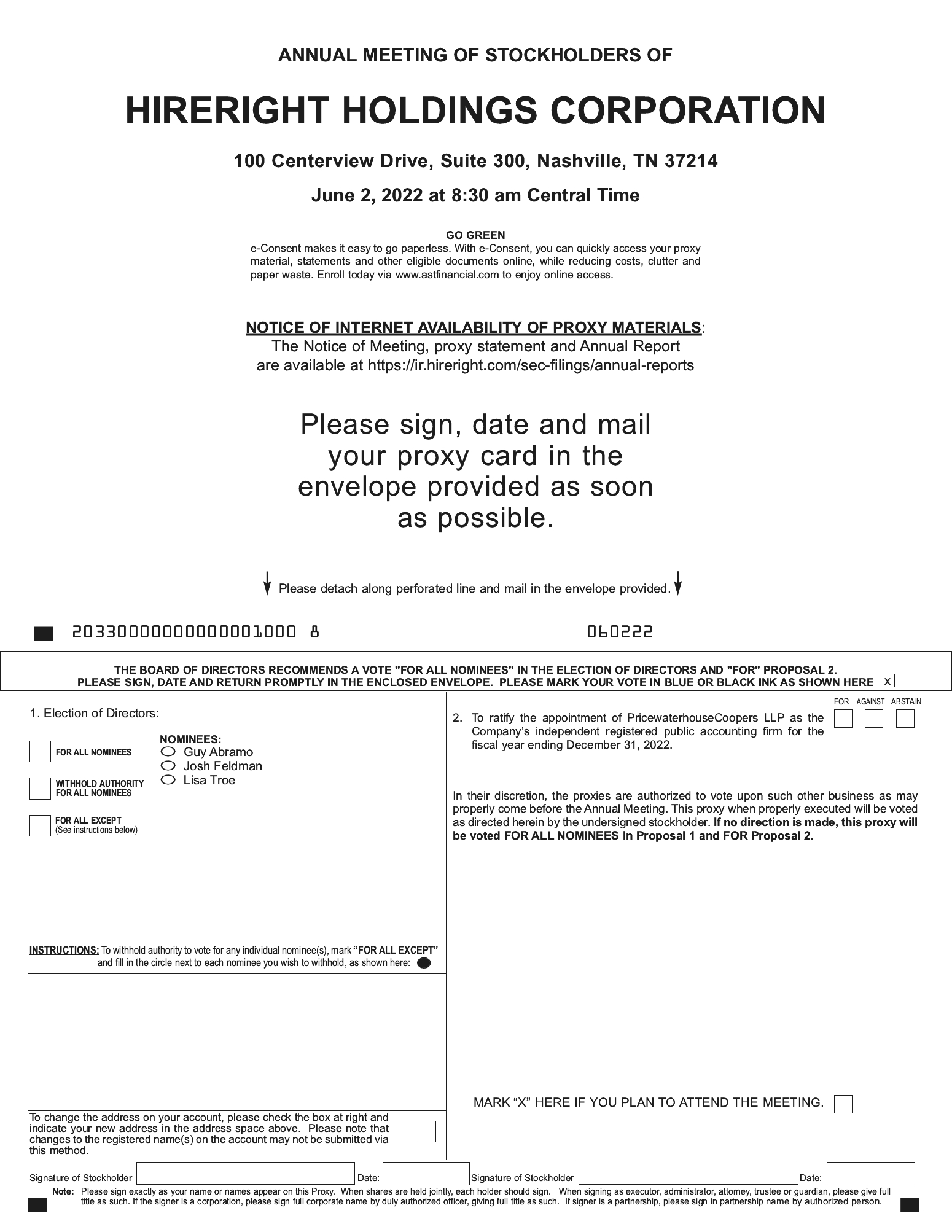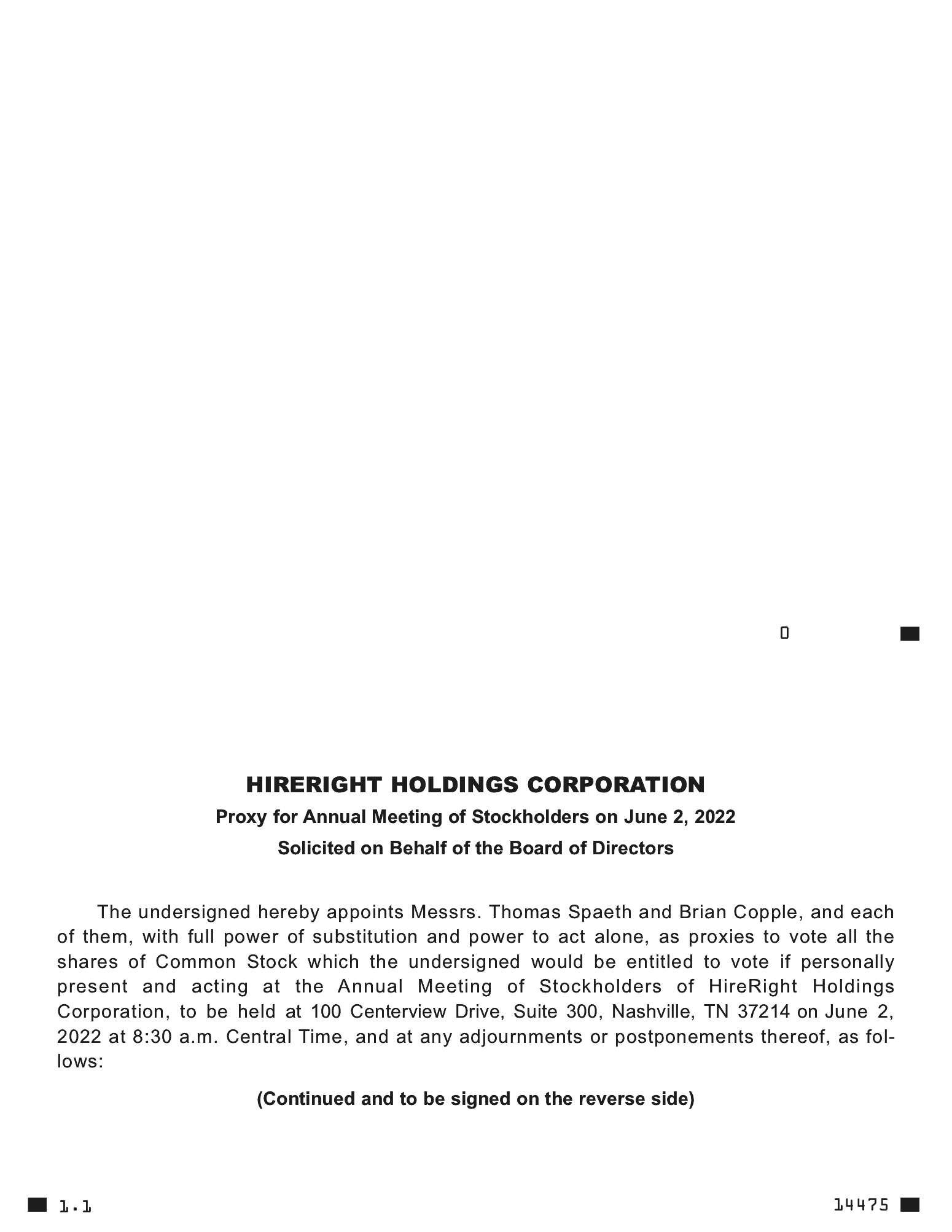The Board of Directors, at the time of the preparation of this proxy statement, knows of no business to come before the Annual Meeting other than that referred to herein. If any other business properly comes before the Annual Meeting or any adjournment or postponement thereof, the persons named in the enclosed proxy will have authority to vote, in their discretion, all shares represented by such proxies that have been received and not theretofore properly revoked.
We file our annual reports on Form 10-K, quarterly reports on Form 10-Q, current reports on Form 8-K, proxy statements, and other documents electronically with the SEC under the Exchange Act. You may obtain such reports from the SEC’s website at www.sec.gov.
Our Investor Relations website address is https://ir.hireright.com. We make available, free of charge through our Investor Relations website, our annual reports on Form 10-K, quarterly reports on Form 10-Q, current reports on Form 8-K, and amendments to those reports filed or furnished pursuant to Sections 13(a) or 15(d) of the Exchange Act as soon as reasonably practicable after such material is electronically filed with, or furnished to, the SEC.
Upon the written request of any record holder or beneficial owner of Common Stock entitled to vote at the Annual Meeting, we will, without charge, provide a copy of our Annual Report on Form 10-K, including the financial statements and the financial statement schedules, for the fiscal year ended December 31, 2021, as filed with the SEC. Requests should be directed to the Office of the Corporate Secretary, HireRight Holdings Corporation, 100 Centerview Drive, Suite 300, Nashville, TN 37214.
CAUTIONARY STATEMENT REGARDING FORWARD-LOOKING STATEMENTS
This proxy statement contains certain information that may constitute “forward-looking statements” within the meaning of the U.S. Private Securities Litigation Reform Act of 1995. While we have specifically identified certain information as being forward-looking in the context of its presentation, we caution you that all statements contained in this proxy statement that are not clearly historical in nature are forward-looking. Without limiting the generality of the preceding sentence, these forward-looking statements are generally identified by the use of forward-looking terminology, including the terms “anticipate,” “believe,” “continue,” “could,” “estimate,” “expect,” “intend,” “likely,” “may,” “plan,” “possible,” “potential,” “predict,” “project,” “should,” “target,” “will,” “would” and, in each case, their negative or other various or comparable terminology, we intend to clearly express that the information deals with possible future events and is forward-looking in nature. However, the absence of these words or similar expressions does not mean that a statement is not forward-looking.
Forward-looking information involves risks, uncertainties and other factors that could cause actual results to differ materially from those expressed or implied in, or reasonably inferred from, such statements. Therefore, caution should be taken not to place undue reliance on any such forward-looking statements. Much of the information in this proxy statement that looks towards future performance of the Company is based on various factors and important assumptions about future events that may or may not actually occur. As a result, our operations and financial results in the future could differ materially and substantially from those we have included in this proxy statement. We assume no obligation (and specifically disclaim any such obligation) to publicly update or revise any forward-looking statements, whether as a result of new information, future events or otherwise, except as required by law.

